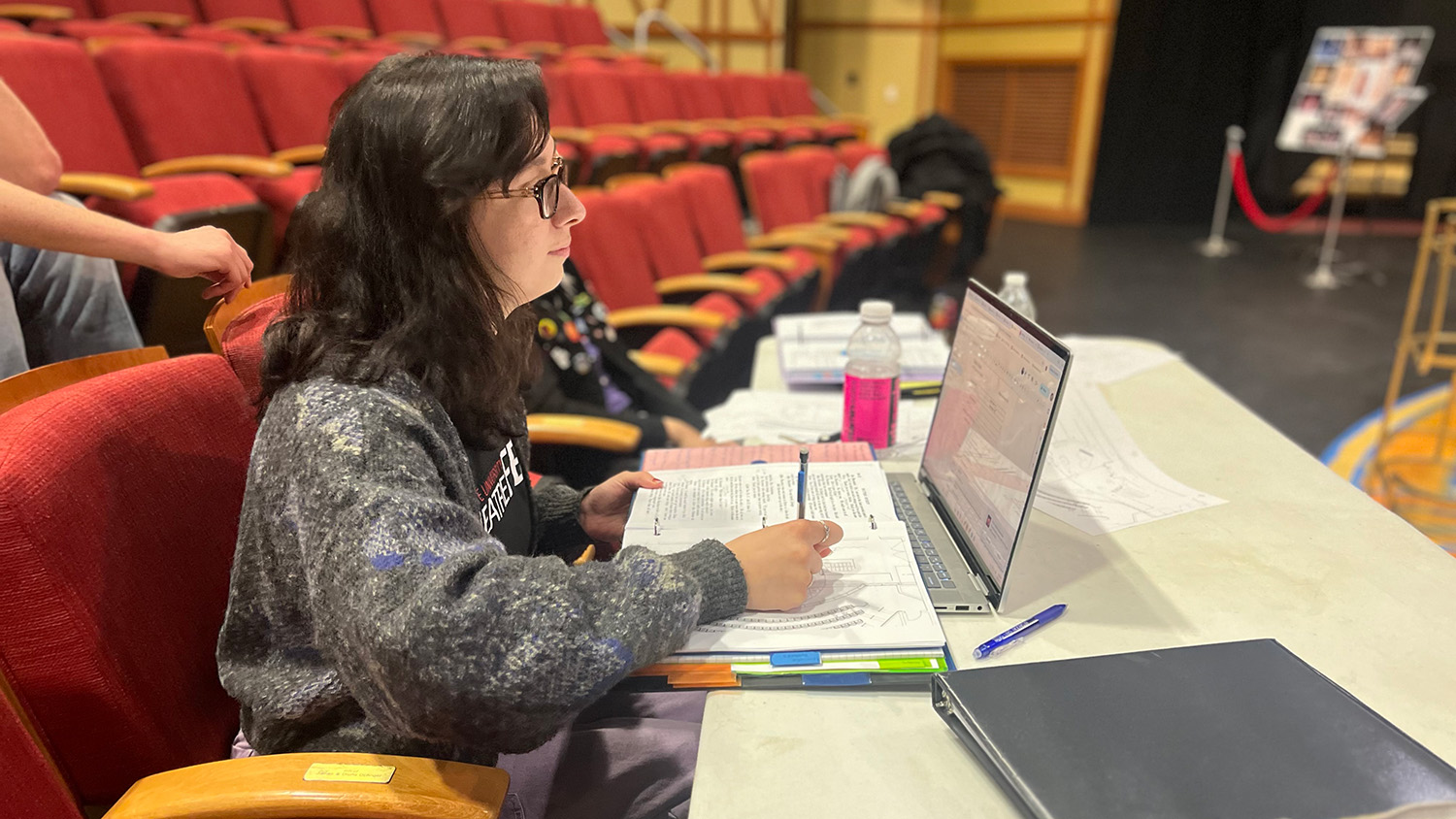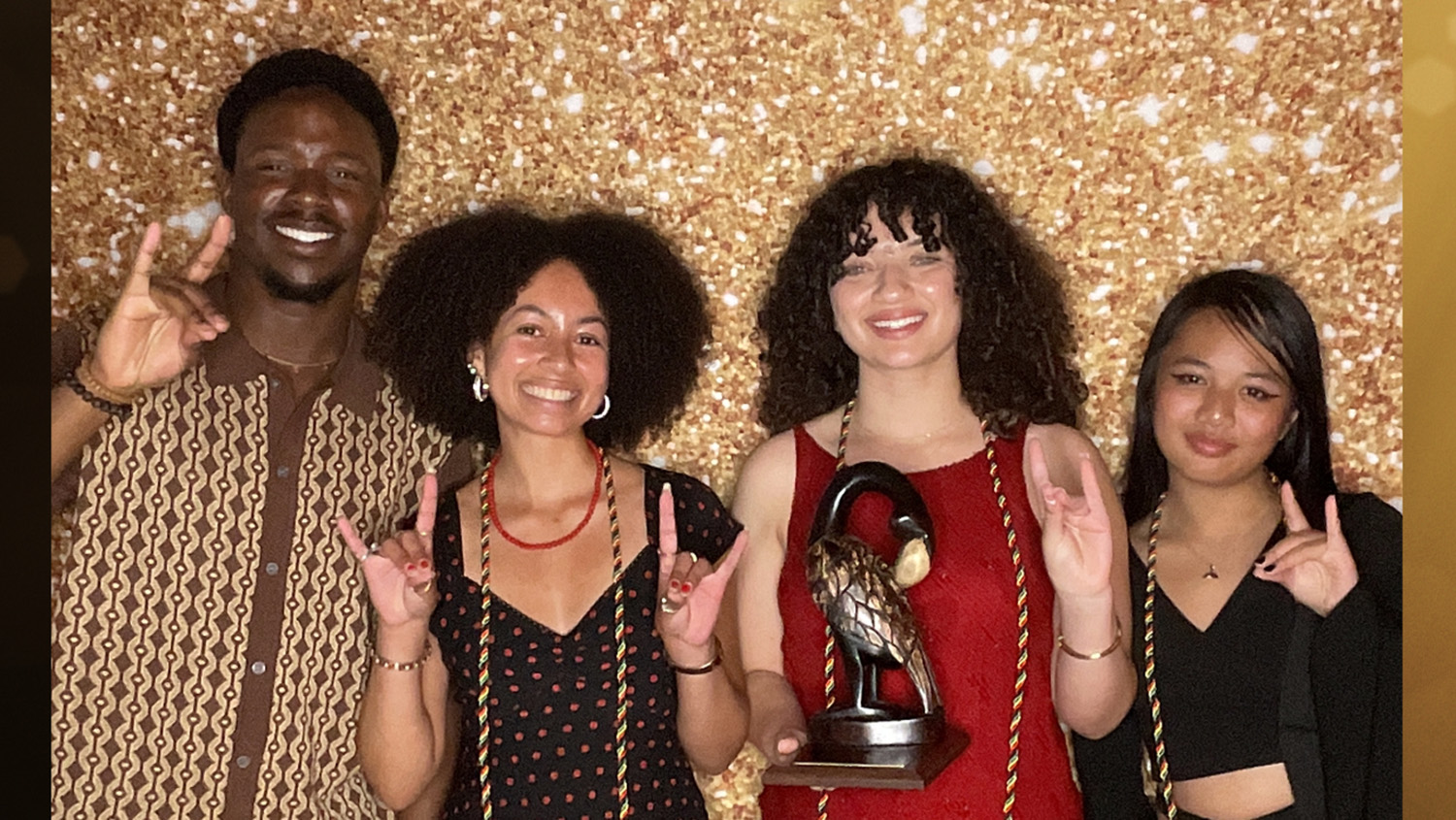Revisiting the Honors Program’s Inclusive Photography Workshop
The UHP follows up with workshop participants months later to see how they’ve been able to apply their new knowledge.
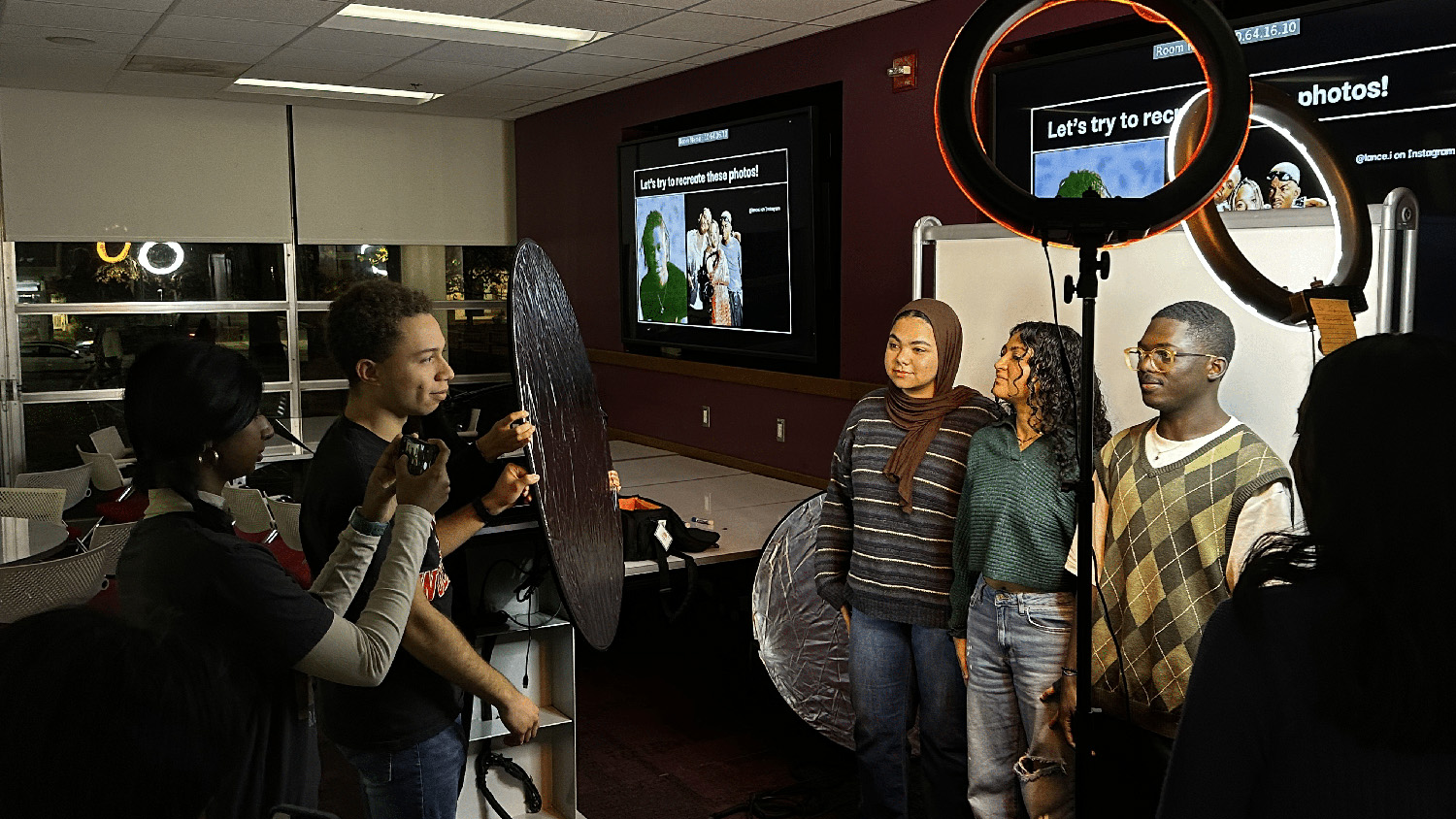
Exposing students to a wide variety of opportunities, events and activities meant to challenge predetermined perspectives and widen worldviews is one of the things the University Honors Program (UHP) does best.
Specially-crafted workshops are offered to Honors Program students relatively infrequently, especially when compared to the vast number of proffered performances, book clubs, outdoor activities, lectures, cultural excursions, and small group discussions, but when they are, they tend to make a big impact on those involved.
Traditionally, the UHP partners with other campus student services, such as the Office of Undergraduate Research, to offer skill-building, confidence-boosting workshops directly to Honors students. This past November, however, a student staff member on the UHP’s media team took the lead on designing a workshop for the benefit of not only his peers in the Honors Program, but also for himself.
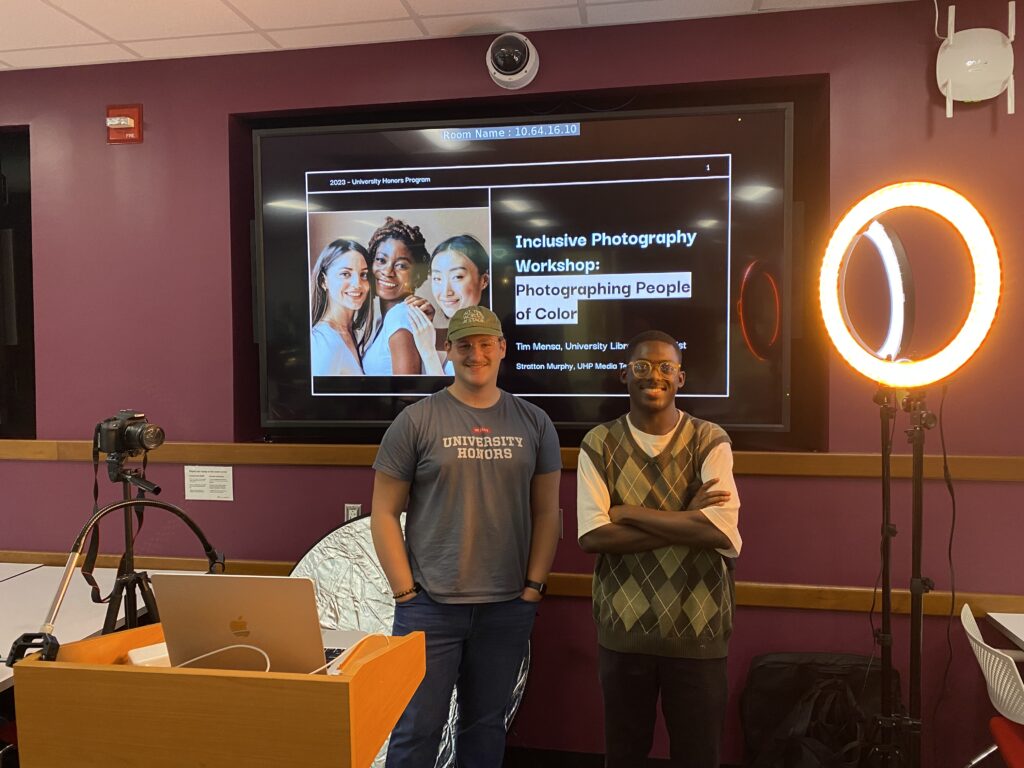
Stratton Murphy, a rising third year double majoring in english (literature concentration) and political science (law & justice concentration) is the UHP’s staff photographer. When his media team supervisor, Meghan Teten, charged Murphy to do something this year for his own professional development, Stratton landed on the idea to develop a photography workshop for his peers in the Honors Program.
Knowing Murphy serves as a resident assistant for University Housing, however, Teten knew program development would not provide much additional professional development for Murphy, unless he took on a topic outside his comfort zone or photographic experience as a white photographer, so she challenged him to focus the workshop through the lenses of equity and inclusion.
Murphy immediately jumped on the opportunity, partnering with Tim Mensa, a Library Specialist who works for NC State Libraries with a passion and part-time pursuit of art and photography.
“I’ve wanted to do something with teaching photography for a while,” says Murphy, “and working with Tim and facilitating this workshop gave me that opportunity to share what I know while also broadening my own perspectives.
“Tim has a lot more experience with photography as an art form. He brought in a lot of techniques and equipment that I may not have thought to use myself; he knew of the equipment the Libraries have that students can rent whenever they want. Having Tim’s perspective as a Black photographer definitely made a lot more of our workshop participants comfortable. He gave the whole workshop a great atmosphere that made everyone feel safe to work within.”
The workshop, entitled, “Inclusive Photography: Photographing People of Color,” was an application-based opportunity for Honors Program students offered in November 2023.
While students enrolled in Honors Forum in the Fall semester had the opportunity to earn Forum activity credit for attending, Murphy and Mensa did not want that to be the main incentive to participate. This inspired the application requirement, which allowed interested students to share their motivations for wishing to participate. The application yielded some enlightening responses for the workshop coordinators, demonstrating the importance of raising awareness around issues of equity and inclusion in fields like photography and art.
In her application for the workshop, participant Abinaya Lakshminathan, at the time a first year accounting student, shared, “As a woman of color, specifically one that has a darker complexion, I often find that when I take pictures with my friends, or even my senior portraits from high school, they don’t even look like me. It sometimes frustrates me that it’s so hard to capture what I naturally look like.”
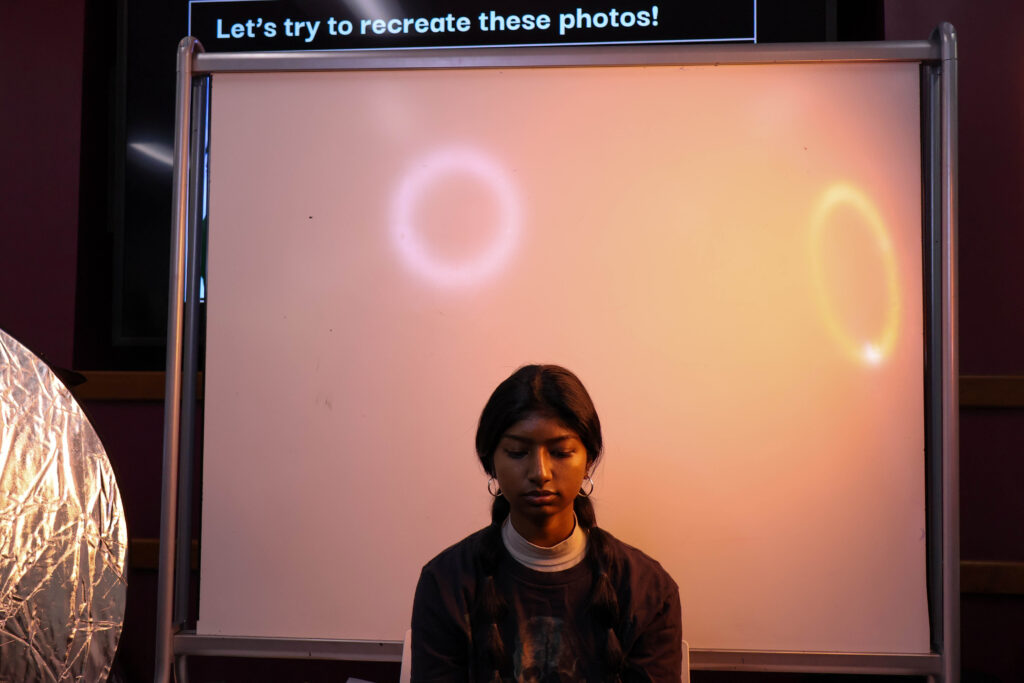
Lakshminathan’s application response was a common one, shared by many of the workshop’s participants of color. Another workshop attendee applied with, “As a person of color, I’ve personally encountered the challenges of inaccurate representation in photography, particularly during significant moments like senior yearbook photos. This firsthand experience has fueled my passion for inclusivity and representation, not only in photography but in art and media as a whole. I believe that by gaining the skills and knowledge from this workshop, I can play a vital role in creating authentic and empowering visual narratives.”
The workshop began with a presentation, researched and delivered by Stratton Murphy and Tim Mensa, about the history of misrepresentation and technology-embedded racism in the photography industry. The workshop coordinators then presented some historical and modern photographic examples of people of colors’ skin tones being represented both poorly and well.
Tips were shared for adjusting settings in modern-day smartphones to improve the capture of darker skin tones in photos, and then all participants got to participate in an activity together to replicate some really well-done images of models of color in media today. Students were provided with various reflector screens and lighting options, available for rent from NC State Libraries, to manipulate the environment to best capture their peers’ different skin tones.
Jonathan Rogers is a rising second year studying Computer Engineering. He is also the UHP’s staff videographer. He reflected, “The workshop was extremely helpful in displaying how the position, intensity, and color of lighting can affect how people are seen through the camera lens. The workshop demonstrated specific examples of how this has been historically used to misrepresent people of color in the media and how this misrepresentation can appear accidentally without proper considerations taken into diversity.”
When asked how he would be able to use what he learned in his role as videographer for the Honors Program, Rogers stated, “Throughout the remainder of the year, I have been able to use the information to update the lighting configurations during the production of some of the content I have generated for the UHP. This is especially important as the students who are interviewed often come from various backgrounds and ethnicities, therefore, considerations are needed into how to film to factor in diversity. I often look back at the experience that I gained from the workshop due to the nature of my work. Although most of the content that I produced is in the form of video, similar standards and requirements apply as does with photography content.”
Murphy said that “by reading the original application responses for this workshop, I learned that this is a problem that a lot of people have had experience with in very personal ways. Having learned from Tim during the workshop itself, I can now approach my photography in a way that I had never considered, using techniques that I’ve never consciously thought about before, to be able to better include diverse groups in my work. I also learned how to approach the subject of inclusion in art and photography in a way that everyone can learn from it, providing a safe space to respect others and experiment with photography to get the best result for everyone.”
Deni Lewis just graduated from NC State and the Honors Program this May with her degree in Graphic Design and minors in Business Administration and Business Entrepreneurship. This workshop made such an impression on her that she chose to include it as a highly impactful personal experience in her senior portfolio, the final culminating requirement for completing the University Honors Program.
“I hope to take this knowledge with me in my professional career,” said Lewis. “It is important for designers to step outside of themselves to create for others in order to avoid malpractice and bias in their work. As someone with very fair skin, I want to improve my ability to photograph others who look different from myself. Everyone deserves the opportunity to have their appearance be well-represented.”
Workshop participants like Lewis are the type of people that those who work to raise awareness around diversity, equity and inclusion hope to attract to educational programming. With regard to who applied to participate in this workshop, students of color far outnumbered white applicants. While, undoubtedly, the participants of color benefited and learned just as much as their white peers, they are likely also already aware of the challenges faced by people of color often with regard to representation in media.
This is one of the many reasons why Murphy encourages his peers in the Honors Program to “sign up for stuff! You never know what opportunities are going to come your way. Things can surprise you. You can learn a lot from all these opportunities that may not necessarily be something that you would normally participate in. Put yourself out there to try new and different things.”
Mensa reflected on teaching this workshop for the first time; “It’s empowering and surprisingly rare in a higher academic setting to be vulnerable with your peers and share stories that can support everyone in the room. The workshop goal wasn’t so much about building skills as a photographer than it was building the meta-skill of compassion and awareness when producing media. That, to me, is always more compelling than any fancy camera rigs or big budget sets. It made me smile that the sentiment was shared among the participants as well.”
- Categories:

